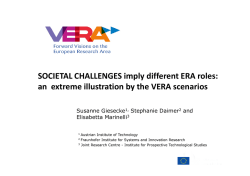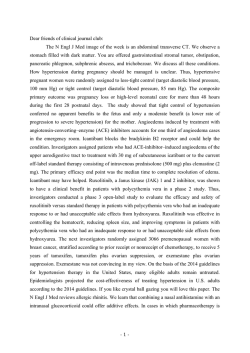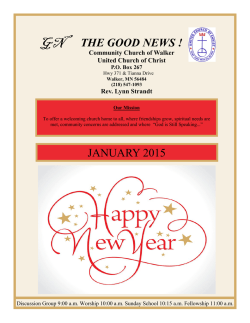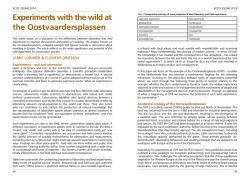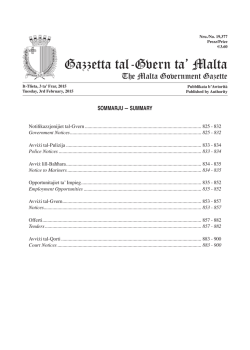
here as a PDF - WordPress.com
Source: Israel Zangwill, The Melting-Pot (New York: American Jewish Book Company, 1921). From an electronic version by Project Gutenberg, http://www.gutenberg.org/files/23893/23893-h/23893-h.htm (accessed Jan. 15, 2015). Excerpts selected and reformatted for readability by John-Charles Duffy. The Melting Pot Israel Zangwill (1908) […] DAVID: (Opens [the letter] eagerly, then smiles broadly with pleasure.) Oh, Miss Revendal! Isn’t that great! To play again at your Settlement. I am getting famous. VERA: But we can’t offer you a fee. […] DAVID: A fee! I’d pay a fee to see all those happy immigrants you gather together—Dutchmen and Greeks, Poles and Norwegians, Welsh and Armenians. If you only had Jews, it would be as good as going to Ellis Island. VERA: (Smiling) What a strange taste! Who on earth wants to go to Ellis Island? DAVID: Oh, I love going to Ellis Island to watch the ships coming in from Europe, and to think that all those weary, sea-tossed wanderers are feeling what I felt when America first stretched out her great mother-hand to me! VERA: (Softly) Were you very happy? DAVID: It was heaven. You must remember that all my life I had heard of America— everybody in our town had friends there or was going there or got money orders from there. The earliest game I played at was selling off my toy furniture and setting up in America. All my life America was waiting, beckoning, shining—the place where God would wipe away tears from off all faces. (He ends in a half-sob.) MENDEL: (Rises, as in terror) Now, now, David, don’t get excited. (Approaches him.) DAVID: To think that the same great torch of liberty which threw its light across all the broad seas and lands into my little garret in Russia, is shining also for all those other weeping millions of Europe, shining wherever men hunger and are oppressed—— MENDEL: (Soothingly) Yes, yes, David. (Laying hand on his shoulder) Now sit down and—— DAVID: (Unheeding) Shining over the starving villages of Italy and Ireland, over the swarming stony cities of Poland and Galicia, over the ruined farms of Roumania, over the shambles of Russia—— MENDEL: (Pleadingly) David! DAVID: Oh, Miss Revendal, when I look at our Statue of Liberty, I just seem to hear the voice of America crying: “Come unto me all ye that labour and are heavy laden and I will give you rest—rest——” (He is now almost sobbing.) MENDEL: Don’t talk any more—you know it is bad for you. DAVID: But Miss Revendal asked—and I want to explain to her what America means to me. MENDEL: You can explain it in your American symphony. VERA: (Eagerly—to David) You compose? DAVID: (Embarrassed) Oh, uncle, why did you talk of—? Uncle always—my music is so thin and tinkling. When I am writing my American symphony, it seems like thunder crashing through a forest full of bird songs. But next day—oh, next day! (He laughs dolefully and turns away.) VERA: So your music finds inspiration in America? DAVID: Yes—in the seething of the Crucible. VERA: The Crucible? I don’t understand! DAVID: Not understand! You, the Spirit of the Settlement! (He rises and crosses to her and leans over the table, facing her.) Not understand that America is God’s Crucible, the great Melting-Pot where all the races of Europe are melting and re-forming! Here you stand, good folk, think I, when I see them at Ellis Island, here you stand (Graphically illustrating it on the table) in your fifty groups, with your fifty languages and histories, and your fifty blood hatreds and rivalries. But you won’t be long like that, brothers, for these are the fires of God you’ve come to—these are the fires of God. A fig for your feuds and vendettas! Germans and Frenchmen, Irishmen and Englishmen, Jews and Russians—into the Crucible with you all! God is making the American. MENDEL: I should have thought the American was made already—eighty millions of him. DAVID: Eighty millions! (He smiles toward Vera in good-humoured derision.) Eighty millions! Over a continent! Why, that cockleshell of a Britain has forty millions! No, uncle, the real American has not yet arrived. He is only in the Crucible, I tell you— he will be the fusion of all races, perhaps the coming superman. Ah, what a glorious Finale for my symphony—if I can only write it. […] DAVID: […] (He throws his arms boyishly round his uncle.) I am so happy. MENDEL: Happy? DAVID: She loves me—Vera loves me. MENDEL: Vera? DAVID: Miss Revendal. MENDEL: Have you lost your wits? (He throws David off.) DAVID: I don’t wonder you’re amazed. Maybe you think I wasn’t. It is as if an angel should stoop down—— MENDEL: (Hoarsely) This is true? This is not some stupid Purim joke? DAVID: True and sacred as the sunrise. MENDEL: But you are a Jew! DAVID: Yes, and just think! She was bred up to despise Jews—her father was a Russian baron—— MENDEL: If she was the daughter of fifty barons, you cannot marry her. DAVID: (In pained amaze) Uncle! […] You say that! You who have come to the heart of the Crucible, where the roaring fires of God are fusing our race with all the others. MENDEL: (Passionately) Not our race, not your race and mine. DAVID: What immunity has our race? (Meditatively) The pride and the prejudice, the dreams and the sacrifices, the traditions and the superstitions, the fasts and the feasts, things noble and things sordid—they must all into the Crucible. MENDEL: (With prophetic fury) The Jew has been tried in a thousand fires and only tempered and annealed. […] Many countries have gathered us. Holland took us when we were driven from Spain—but we did not become Dutchmen. Turkey took us when Germany oppressed us, but we have not become Turks. DAVID: These countries were not in the making. They were old civilisations stamped with the seal of creed. In such countries the Jew may be right to stand out. But here in this new secular Republic we must look forward—— […] MENDEL: You are mad already—your dreams are mad—the Jew is hated here as everywhere—you are false to your race. DAVID: I keep faith with America. I have faith America will keep faith with us. (He raises his hands in religious rapture toward the flag over the door.) Flag of our great Republic, guardian of our homes, whose stars and—— MENDEL: Spare me that rigmarole. Go out and marry your Gentile and be happy. DAVID: You turn me out? MENDEL: Would you stay and break my mother’s heart? You know she would mourn for you with the rending of garments and the seven days’ sitting on the floor. Go! You have cast off the God of our fathers! DAVID: (Thundrously) And the God of our children—does He demand no service? (Quieter, coming toward his uncle and touching him affectionately on the shoulder.) You are right—I do need a wider world. (Expands his lungs.) I must go away. […] VERA: […] Look! How beautiful the sunset is after the storm! (David turns. The sunset, which has begun to grow beautiful just after Vera’s entrance, has now reached its most magnificent moment; below there are narrow lines of saffron and pale gold, but above the whole sky is one glory of burning flame.) DAVID: (Prophetically exalted by the spectacle) It is the fires of God round His Crucible. (He drops her hand and points downward.) There she lies, the great Melting Pot—listen! Can’t you hear the roaring and the bubbling? There gapes her mouth (He points east) —the harbour where a thousand mammoth feeders come from the ends of the world to pour in their human freight. Ah, what a stirring and a seething! Celt and Latin, Slav and Teuton, Greek and Syrian,—black and yellow—— VERA: (Softly, nestling to him) Jew and Gentile—— DAVID: Yes, East and West, and North and South, the palm and the pine, the pole and the equator, the crescent and the cross—how the great Alchemist melts and fuses them with his purging flame! Here shall they all unite to build the Republic of Man and the Kingdom of God. Ah, Vera, what is the glory of Rome and Jerusalem where all nations and races come to worship and look back, compared with the glory of America, where all races and nations come to labour and look forward! (He raises his hands in benediction over the shining city.) Peace, peace, to all ye unborn millions, fated to fill this giant continent—the God of our children give you Peace. (An instant’s solemn pause. The sunset is swiftly fading, and the vast panorama is suffused with a more restful twilight, to which the many-gleaming lights of the town add the tender poetry of the night. Far back, like a lonely, guiding star, twinkles over the darkening water the torch of the Statue of Liberty. From below comes up the softened sound of voices and instruments joining in “My Country, ‘tis of Thee.” The curtain falls slowly.)
© Copyright 2026
